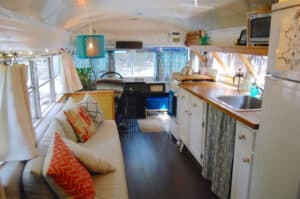
Tiny Homes: Bus Version
Have you heard about Tiny Homes?
Tiny homes are fully equipped houses built on a much smaller scale than conventional homes. This concept is inspired by the Japanese philosophy of making even the smallest space functional and efficient.
Interestingly, the tiny home movement has expanded beyond houses and into an unexpected space: buses.
Yes—retired school buses or public buses that are no longer in service are being transformed into fully functional homes.
Living in a Bus: A Growing Trend
Buses converted into homes have become increasingly popular in recent years. People who choose this lifestyle enjoy a unique combination of mobility, freedom, and comfort.
These bus homes are commonly known as “skoolies,” a name that comes from their origins as school buses.
One of the biggest advantages of living in a bus home is the ability to take your home anywhere.
You can travel freely, live in different locations, and explore new places without leaving your living space behind. This lifestyle is especially appealing to people who love to travel, live nomadically, or seek a more environmentally sustainable way of life.
Cost Benefits of Bus Homes
Another major advantage of bus living is cost savings.
Compared to a traditional home, bus homes are significantly more affordable—both in the initial purchase and in ongoing living expenses.
You can often buy a used bus for just a few thousand dollars, and maintenance costs are relatively low.
This makes living in a bus an attractive option for:
-
People pursuing a minimalist lifestyle
-
Individuals looking to reduce housing expenses
-
Those living on a tight budget
Challenges of Living in a Bus Home
Despite its many benefits, living in a bus home also comes with challenges.
One of the most common concerns is lack of privacy.
Bus homes are often parked in public spaces, which means you need to be comfortable with people looking inside—or even knocking on your door.
Noise and distractions can also be an issue, especially in urban areas.
Having a private spot outside the city, where you know you won’t be disturbed, can make a big difference.
Legal and Zoning Considerations
Another important aspect to consider is local laws and regulations.
Some cities and towns have zoning rules that restrict where you can park or live in a bus home. In many cases, special permits or approvals may be required.
Before committing to this lifestyle, it’s essential to research local regulations and plan accordingly.
Is the Bus Life Worth It?
Despite the challenges, many people who live in bus homes find the experience incredibly rewarding.
The freedom, independence, and flexibility that come with living on wheels are unmatched.
Additionally, the bus-living community is often close-knit and supportive, offering advice, inspiration, and encouragement to fellow travelers.
Living in a bus home requires time, effort, and dedication—but for those willing to embrace the challenge, it can be a truly fulfilling way of life.
Whether you’re seeking a sustainable lifestyle, the freedom to travel, or a simpler way of living, a bus home may be the perfect solution.
Living in a bus home has both benefits and challenges.
But for those ready to invest the effort, it offers a unique, adventurous, and deeply rewarding experience that few other lifestyles can match.
Frequently Asked Questions
✅ How much does it cost to convert a bus into a tiny home?
➡️ The cost can range from $10,000 to $50,000, depending on materials, design, and whether you do the work yourself or hire professionals.
✅ Are bus homes legal to live in?
➡️ Legality depends on local zoning laws and regulations. Some areas allow bus living with permits, while others have restrictions.
✅ How long does it take to convert a bus into a home?
➡️ Most conversions take 6 months to 2 years, depending on complexity, budget, and available time.
✅ Do bus homes have plumbing and electricity?
➡️ Yes. Many bus homes include solar panels, water tanks, composting toilets, and full electrical systems.
✅ Is living in a bus home environmentally friendly?
➡️ Bus homes can be eco-friendly, especially when using solar energy, recycled materials, and efficient water systems.
✅ Is bus living suitable for families or couples?
➡️ Yes, but space planning is crucial. Many couples and small families successfully live in bus homes with smart layouts and multifunctional furniture.








